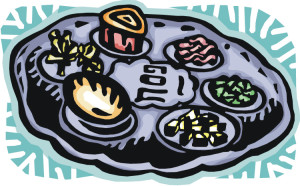We conclude our 3-part series of Chinuch Halachos for Pesach with the important halachos for the Seder.
Chinuch Halachos for Pesach (Part 3)

A. The Seder
1. At the seder on each of the first 2 nights of Pesach, one is obligated to perform 6 mitzvos:
a) Relate the story of the exodus from Egyptb) Eat matzah
c) Eat maror (bitter herbs)
d) Drink 4 cups of wine
e) Eat the afikoman
6) Recite Hallel

B. Relate the story of the exodus from Egypt
1. The Torah commands every Jewish parent to relate the story of our exodus from Egypt to our children on the night of Pesach. Everyparent should make sure that his/her child(ren) listen(s) to the Haggadah and understand(s) it. One should translate the Haggadah and
explain it to the children.
2. It is insufficient that the child ask the 4 Questions. The parent must answer the questions according to each child’s comprehension.This applies to every child who is old enough (5 or 6 yo) tocomprehend at least some part of this story.

C. Eat Matzah
1. Torah obligation requires one to eat 1 k’zayis of matzah, whereas Rabbinic obligation requires one to eat 2 k’zaysim of matzah. [2],[3]
2. Boys and girls who have reached the age of chinuch must be trained to fulfill this mitzvah. However, if it is difficult for the child toeat 2 k’zaysim, at least 1 k’zayis should be eaten. [2]
3. In order to fulfill the mitzvah of eating matzah, one must consume a k’zayis within the period of k’dei achilas p’ras. There isa dispute among Poskim as to the duration of that period. Preferably,adults should attempt to eat the k’zayis of matzah within 2 minutes. However, children may be allowed 9 minutes. If a child cannot eat anentire k’zayis within 9 minutes, he should not recite the beracha ‘AlAchilas Matzah’. [2] [ Moderator’s Note: I consulted RAbbi Tendler regarding the time limit. This is what he says “The whole point of the timerequirement is just to insure that it will be a “normal eating”as opposed to just nibbling over an extended period of time. It is not necessary to time yourself if you are eating normally-just eat it and enjoy!” ]

D. Eat Maror (Bitter Herbs)
1. Parents are obligated to train each child of chinuch age to eat a k’zayis of bitter herbs. Since it is difficult for children ofchinuch age to eat a k’zayis of horseradish, it is advisable to give them another halachically acceptable type of bitter herbs (e.g.rommaine lettuce or endives). [2]
2. Children of chinuch age should be trained to eat korech – the sandwich of matzah and maror. [2]

E. Drink 4 Cups of Wine [2]
1. Children who have reached chinuch age should be given 4 cups of wine (or grape juice) to drink at the appropriate points during theseder.
2. A child’s cup, just as an adult’s cup, must be large enough to hold a revi’is of wine. Adults are obligated to drink the greaterportion of a revi’is of the four cups. Children, however, must only drink a melo lugmav (a cheekful) amount of wine/grape juice. Melo lugmav is the equivalent of the amount of wine it would take to makethe person’s cheek bulge out if the wine was all concentrated on oneside of his mouth.
3. What is a revi’is? This is subject to interpretation. Ask your Rav.
[ Moderator’s Note: Rabbi Tendler says that a revi’is is a 3.3oz, and that if this is difficult, one can go with 2.9 ozs.]
F. Eat the Afikoman
1. Children who have reached the age of chinuch should be trained to
eat the afikoman. It is customary for adults to eat 2 k’zaysim of
matzah but children are only required to eat 1 k’zayis. [2]
1. A child who understands the concept of praising HaShem for redeeming us from the Egyptian bondage should be trained to reciteHallel at the seder. [2]
H. Reclining at the seder
1. All men are required to recline on their left side while eating and drinking the 4 cups of wine. Boys who perform these mitzvosshould be taught similarly to recline. [2]
J. Sefiras HaOmer
1. Sefiras HaOmer, the counting of the omer, begins on the 2nd night of Pesach. Parents are obligated to train boys of chinuch age(approximately 6 or 7 yo) in this mitzvah. [1] [2]
2. If a child forgot to count the omer the entire night, he counts during the daytime without a brocha. On subsequent nights, he countswith a brocha. [2]
3. If he forgot to count the omer the entire day and did not remember until the following evening, he should count on all the subsequentdays, but without a brocha. [2]
4. If a boy becomes bar mitzvah during Sefiras HaOmer, there are differing views. Some Poskim argue that the boy’s counting prior tohis BM was done to fulfill the obligation of chinuch only and not fora personal obligation, and therefore it is considered as if he missed
part of the counting of the Omer, and is not permitted to count the rest of the omer with a beracha. [1] Others argue that the boy’s previous counting as fulfillment of chinuch is sufficient to consider all the days having been counted,and therefore he may continue to count after his BM with a brocha. [1] Some rule that he may only do so if he has previously counted with a brocha every night before his bar mitzvah. [2]
5. Regarding women, since this is a positive time-bound mitzvah, they are exempt. However, some women have accepted this obligation onthemselves and customarily count the Omer. Some Ashkenazicauthorities rule that women may recite the beracha over it, while others rule that they should not. Sephardic authorities rule to thelatter. Parents who wish to train their girls in this mitzvah followthe preceeding customs. [1] [ Moderator’s Note: Regarding women taking on obligations which they are exempt, I read in [4] that Magen Avraham is ofthe opinion that women who choose to observe mitzvos that they are not obligated in such as time-bound mitzvos, subject themselves to a vow when they perform the mitzvos 3 times,unless they specifically have intention of not bindingthemselves permanently. If they didn’t have such an intention, then they will need to annul their vow shouldthey not want to keep those mitzvos.
I asked Rabbi Tendler these questions:
1. Is this still in force today?
2. Do the 3 times mean consecutively or any 3 times during a period of time?
This is what he says:
1. Yes. HOWEVER- this is only true if the circumstances are the same. For example, if you would do a Mitzvah three timesbefore you had kids, this does not constitute a vow thatwould require you to do this Mitzvah after you have kids.
2. Consecutively. If some times you did it and other times not, this can not be considered a vow at all- you only do itwhen convenient.
]
REFERENCES:
[1] A Parent’s Guide to Teaching Children Mitzvot by Rabbi ShmuelSinger [2] Children In Halachah by Rabbi Simcha Bunim Cohen [3] Halachos of K’zayis by Rabbi Yisroel Pinchos Bodner [4] Halichos bas Yisrael by Rabbi Yitzhak Yaakov Fuchs